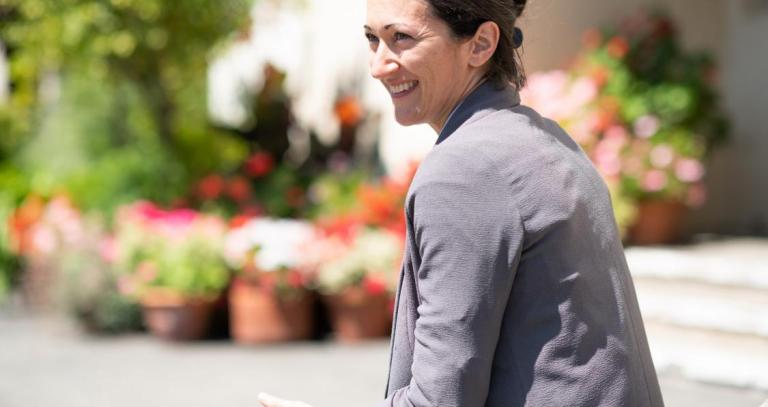Program description
You want to make your organization, and the world, a better place. You see social innovation as a way to help solve difficult problems, and you want to become a changemaker—someone who finds the solutions. You're looking for the knowledge, skills, strategies and expertise to make that positive social change a reality.
The Graduate Certificate in Corporate Social Innovation helps professionals like you, who are working in or consulting with organizations in all sectors. You’ll gain graduate-level expertise in social and environmental innovation. You'll have the chance to apply that knowledge for yourself, your teams and your organization. And you’ll discover how to increase corporate value by inspiring and enabling positive social change in organizations, communities and the world.
You’ll apply your learning by looking at the following areas:
- foundations for driving social and environmental change, while advancing core business objectives
- creative thinking and innovation in solving organizational and social problems and challenges
- measuring, evaluating and reporting on social impact
- scaling for effective impact, locally and globally
- learning in the areas of design thinking, organizational strategy and organizational culture
- practical change-making skills including empathy, teamwork and leadership
You can build from here
When you successfully complete this program you have career advancing options:
- You can complete this program as a specialization option for the MBA in Executive Management and Master of Global Management (MGM) programs.
- If you have already completed this program, you can transfer all credits to the Royal Roads MBA, MGM, MA in Tourism Management, MA in Interdisciplinary Studies and MA in Leadership (Executive Leadership Specialization) programs.
Focus on one thing at a time
You can take any two of the courses from the Graduate Certificate in Corporate Social Innovation as part of our General Studies program. You can transfer credit from these courses to certificates, diplomas and degree programs later if you decide to take your studies further.
Program outcomes
Once you have completed this program, you'll have skills like problem solving, creative thinking and innovation, which prepare you to work in industries across numerous sectors.
Program delivery
This program is delivered online and includes a virtual residency.
Online learning
Online courses consist of assigned readings, synchronous or asynchronous lectures, interactive discussions, and individual and team assignments.
You’re expected to meet deadlines and contribute meaningfully to your class. Your contributions are a big part of everyone’s learning.
You’ll take one online course at a time for a period of nine weeks. Each online course requires approximately 15 hours of work per week.
You'll start your program with a non-credit, but required, course about academic integrity.
Virtual residency
This program has one five-day virtual residency which occurs midway through the program.
Residencies are intensive and immersive. Many students say this time together is the highlight of their program.
During your virtual residency, you can expect to:
- attend virtual classes full time (e.g., Monday to Friday from 8:30 a.m. to 4:30 p.m.)
- complete homework and individual and team assignments outside of class hours
Courses
Faculty
Transfer agreements
Refine results
Admission to this program is based on the applicant’s balance of work and life experience, including volunteer and community activities, practical experience or related training.
Standard admission
- Completion of either an undergraduate four-year (or comparable) degree or a graduate degree in arts, business, or environmental studies (or other acceptable alternative) from a recognized post-secondary institution.
- Normally, at least two years of relevant full-time experience in leadership, management, communication, training, marketing, or consultant roles.
Flexible admission
- To be considered for flexible admission, applicants would normally require at least five years of extensive, relevant work experience and some post-secondary education.
English language proficiency
- If English is not your primary language, please review our English language requirements.
All applications to this program require submission of the following information and supporting documents before your file can be assessed for admission:
Application form
In order to apply online, you will be required to create a log-in account using your email address. You will be required to list all credit courses and/or programs you have completed or are currently enrolled in. An application fee will be required. If your application fees are being paid by a third party, review sponsored student information. Once submitted, you may check the status of your application at any time.
Missed your application deadline? While we can’t make any guarantees, we may be able to accommodate late applications if there's still space and enough time to process. If you're interested in an intake that is now closed to applications, apply for the next available intake and email Admissions with your preferred start date. Make sure you’re prepared to submit your program's required documents right away. We can't make an admissions decision without them.
Official transcripts
In accordance with RRU's admissions policy and practices, applicants are required to submit official transcripts from all post-secondary (higher education) institutions currently or previously attended, though exceptions may apply for some Graduate Certificate in Corporate Social Innovation applicants as outlined below:
- All applicants must declare all post-secondary studies (courses, programs, transfer credit, etc.) in their application.
- As part of the application process, applicants anticipating acceptance by standard admission will be required to provide an official transcript for the highest level, most relevant and/or most recent degree credential(s). Whenever possible, applicants are also encouraged to provide unofficial (or official) transcripts from all other institutions currently or previously attended. Additional documents may be requested at any time during the application process. Additionally, upon acceptance Admissions will determine which, if any, additional transcripts or documents will be required, and these requirements may be noted as a condition of admission.
- As part of the application process, applicants anticipating consideration under flexible admission must submit all official transcripts for all institutions currently or previously attended.
In all cases, applicants are responsible for arranging for the submission of official transcripts. Transcripts are considered official only if submitted directly by the Registrar or other recognized authority of the providing institution in the institution's original, sealed envelope. If the envelope has been opened, the transcripts are no longer official and new (official) transcripts will be required to complete your application.
Transcripts are not required for non-credit programs or courses, though some programs may require proof of professional certifications or designations.
All international transcripts or credentials are subject to an international transcript and/or credential evaluation.
Personal statement
The personal statement should be approximately one page in length and outline your motivation for seeking entrance to the program. The statement should address the topic of how the Graduate Certificate program that you are applying for will contribute to your future career. Relate this to who you are, what you feel you will gain from the program, and the strengths you feel you could bring to the program.
Résumé
A detailed résumé provides the Admissions Office with as much information about your work and life experiences as possible. We are interested in knowing where you have worked, for how long, and what you were responsible for in the positions you held. Provide as much information as possible, with special attention to the past ten years of your career. We would also like to see any professional development courses, volunteer positions, professional certification, association memberships or international experience that you may have acquired.
Two reference letters
These documents can be written in a variety of formats. In essence, we expect the writer to confirm that you are a suitable candidate for the program, explain why s/he believes you will succeed in such a program, and describe how the program will benefit you. The context in which the referee has come to know you should also be mentioned.
If applicable:
- Applicants declaring permanent resident or Convention Refugee status in Canada must submit a copy of their Permanent Resident Card (PR card) along with their application.
- Transcript evaluation fee or credential evaluation report, if submitting international transcripts.
- An official English language proficiency score report or other evidence of proficiency if English is not your primary language.
- Other information or documents as may be requested to determine your eligibility.
For information on how and where to send your supporting documents, please refer to the document submission guidelines.

